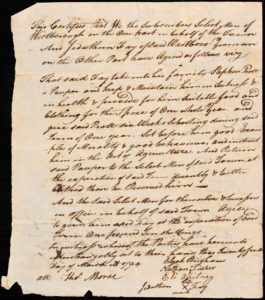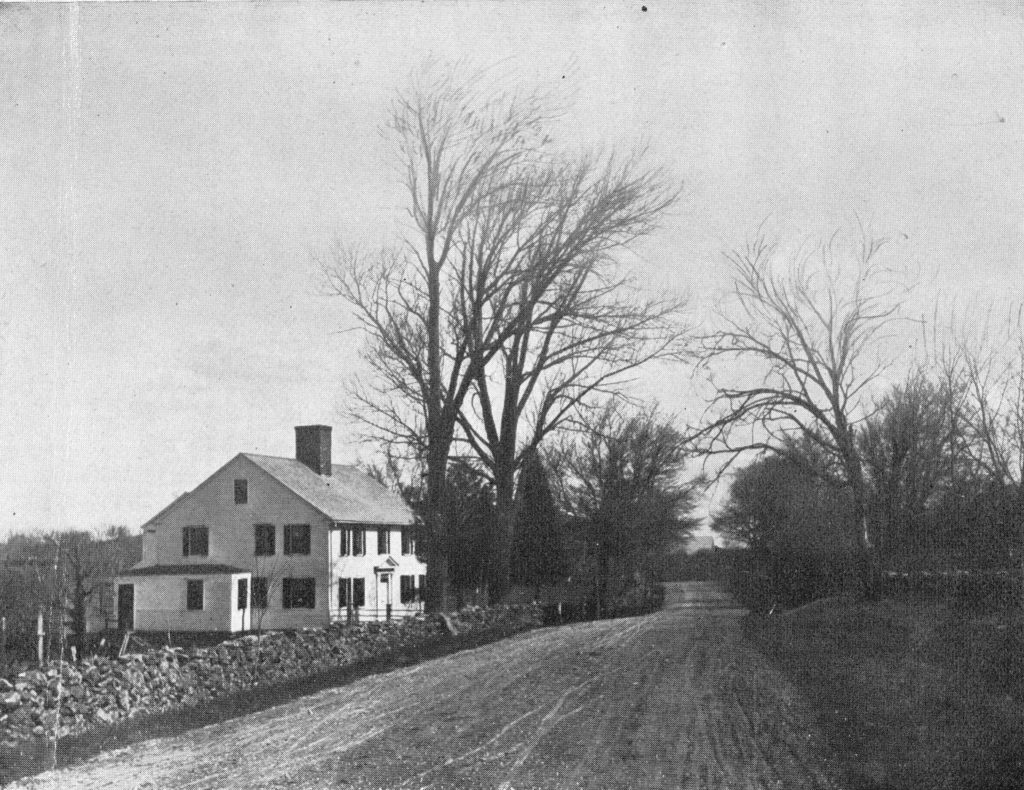
As you read the transcription of the contract below, consider the following questions:
- What is considered important for Stephen Pratt to learn and how is he expected to behave? What will his life be like under the terms of the contract?
- What does the master have to gain from the arrangement? What does he have to lose?
- What does the contract tell us about the town of Westborough and its inhabitants at the time? What social dynamics need to be in place to make such a system of child welfare successful?
- How does the photograph of the house provide context for understanding the contract?
Note that pauper apprenticeship was commonly practiced both before and after the Declaration of Independence was written and the American Revolution took place.
Transcription:
This Certifies that We the Subscribers Select Men of Westborough on the One part in behalf of the Town – And Jeduthun Fay of said Westboro, Yeoman on the Other Part have Agreed as follows viz
That said Fay take into his family Stephen Pratt a Pauper and keep & Maintain him in Sickness & in health & provide for him Suitable food and Clothing for the Space of One whole Year, and give said Pratt six Weeks Schooling during said Term of One year. Set before him good Examples of Morality & good behaviour, and instruct him in the Art of Agriculture. And Return said Pauper to the Select Men of said Town at the experation of said Term decently & better Clothed than he Received him —
And the said Select Men for themselves & Successors in Office in behalf of said Town Agree to give him said Fay at the experation of said Term One pound Ten shillings.
In witness whereof the Parties have hereunto interchangeably set to their hands this Twenty fourth Day of March AD 1794
Elijah Brigham
Nathan Fisher
att. Thos Morse Eli Whitney
his
Jeduthun X Fay
mark
On back:
March 23 1795
Received of the Select Men of Westboro one pound Ten Shilling in full of the within Mentioned Sum
his
Jeduthun X Fay
Mark
Stephen Pratt and His Family
A total of thirty pauper apprentice contracts survive from Westborough, and they were all issued between 1764 and 1829. The contract for Stephen Pratt below does not go into as much detail as other Westborough contracts do about behavior and conduct expected from the child being bound out—perhaps because the term was only for one year, which was also unusual. Most contracts lasted until boys reached the age of twenty-one and girls reached eighteen. It is also the only contract from Westborough that does not identify the child as “poor” and instead calls him “a pauper.” Note that Jeduthun signs the contract with an “X,” which indicates that he was illiterate.
Almost two years after Stephen Pratt finished his term with Jeduthan Fay on March 23, 1795, he was bound out again on February 20, 1797 to Silas Fay. This time, Stephen’s term lasted until he reached the standard age of twenty-one on April 7, 1798. Pratt’s father, Eleazer Pratt, is listed on the contract, so perhaps Stephen went back to live with his father once the first contract with Jeduthan expired. The second contract says that Eleazer had become a charge of the town (i.e., he went on poor relief) and that the Selectmen believed that he could no longer support his son. The contract stipulates that at the completion of Stephen’s term, Silas Fay is required to supply the young man with suitable clothing and five dollars cash.
Stephen was not the first child of Eleazer Pratt to be bound out. On December 17, 1782, Eleazer’s “youngest son” was sent to Joseph Carryl of Hubbardston on a trial basis: if Carryl did not like the boy, he could return him to the town after six months and receive 1 shilling and 6 pence from the Selectmen for his trouble; or he could keep the child until he reaches twenty-one and receive 72 dollars in three equal payments. On May 1, 1788, the Selectmen bound yet another one of Eleazer’s sons belonging to the town, Artimas Pratt, to Asa and Mehetable Forbush. In this contract, Eleazer is described as “being poor & unable to provide for himself and Family, and not taxed, but receives help & Support for his Family from said Town of Westborough.” The Forbushes’ sons were young when the contract was signed, so the older Artimas (most likely 14 at the time) would have been a great help in running the farm.

Go to the next page in the exhibit: Patience Miller.
* * *
Exhibit Navigation for “Changing Pictures of Childhood: A Comparative History of Child Welfare in Westborough”: